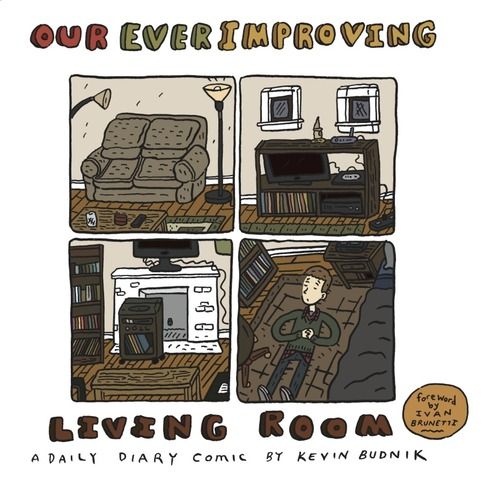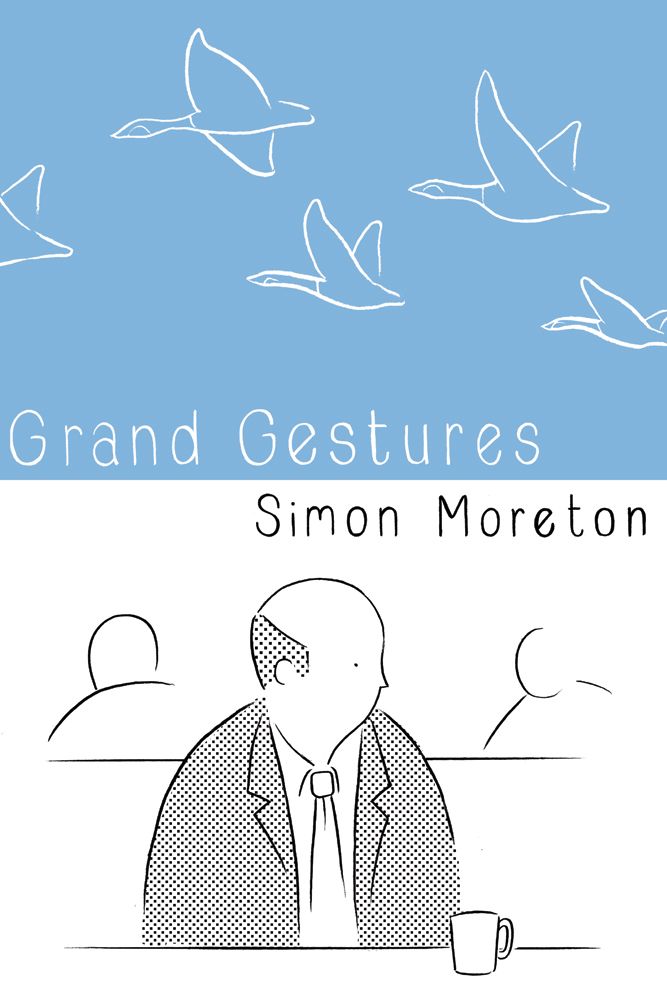There's a growing number of small-press publishers popping up these days, from Koyama Press to Oily Comics and beyond. No doubt that's in large part due to the increasing number of indie-comics conventions like CAKE and SPX, the relative ease of selling your work online, more and more cartoonists trained in basic printing and business skills thanks to schools like the Center for Cartoon Studies, and perhaps even more affordable printing technologies. (I'm guessing at that last one. OK, I'm guessing at all of these.)
Whatever the reason, we are blessed (or, depending on your viewpoint, cursed) with a plethora of minicomics from new and up-and-coming cartoonists. Here then are some short-ish reviews of minis that came to my doorstep from two relatively new publishers: Yeti Press and Retrofit Comics.
Our Ever Improving Living Room by Kevin Budnik ($20): This is a chunky-sized collection of a series of four-panel journal comics Budnik did while attending college. It's similar in style and presentation to James Kochalka's American Elf, although Budnik portrays himself as being a bit more reserved and anxious than Kochalka. It seems like just about everyone and their cat is doing a diary comic of some form these days, and while I can appreciate how the daily rigamarole of that type of comic can improve one's artistic and storytelling skill, there's always a danger in discovering that the examined life turns out to be rather dull. While he's not above highlighting the cute moment or indulging in some unnecessary naval-gazing, Budnik manages to avoid many of the pitfalls of his peers by possessing a self-effacing sense of humor and an appreciation for the minor victories and miseries of life. This is early work, and rough at times, but it shows a good deal of promise and I want to see what he does next.
Pancakes by Kat Leyh ($4): Two young women in a romantic relationship wake up and have breakfast. While the one gets ready to get to work, the other talks about the possibility of them moving in together, an idea that's warmly received. Then there's a bit of a surprise twist about their day jobs that's not really much of a twist at all. The subtitle labels this seven-page comic "a short story," but that's not really accurate; there's no real story here. There's the glimpse of a story, the suggestion perhaps, but nothing more. The big revelation feels more like a weird attempt to juice up the story. Leyh is an impressive craftsman, and I like her way with facial and body gestures, as well as her use of green. But it's all in service to a story that's too shallow for even a slim minicomic.
Now if one of the women had blanched at the moving-in proposal, then you might have had something ...
Beginner's Luck by RJ Casey and David Alvarado: A fish wins big at the (sea turtle) racetrack, blows his (literal) clams on alcohol, drugs and women and then gets his comeuppance from above, as it were. The main draw here is Alvarado's art. I got a kick out of seeing his sweaty, creepy-looking fish people undergoing all sorts of immoral behavior (this comic is sort of like the seedy underbelly of Fish Police). The story is a bit too familiar (basically a tongue-in-cheek version of the old "wages of sin" sermon) but it doesn't overstay it's welcome either.
Grand Gestures by Simon Moreton ($6): One thematic motif I grow increasingly weary of is the whole "Oh, modern life is so repressive and stultifying, especially for the average businessman." It's a motif hammered repeatedly in Gestures, by way of a weary salesman who seemingly envies the flocks of wild geese he encounters on his travels (the geese have wings, you see, and can fly away). What saves this comic from being mired in banal sentimentality, however is Moreton's art style. Minimalist to the point where it can take a moment to figure out what is being represented in certain panels, Moreton seems to be seeing how few lines he can use to represent figures in the waking world. Indeed, at one point the geese are typified by a few s-shaped curves. It's an intriguing approach and I enjoyed parsing through Moreton's elegant, ghostly art, even though I wish it was married to a more substantive story.
Memorexia by Box Brown ($5): This mini is actually published by Ian Harker's Secret Prison line and not Retrofit, but I'm going to throw it in here anyway just for giggles. As with Pancakes, this comic feels like more of a prologue than a complete tale. To wit: Through the use of futuristic technology a man relives the moment when his dad died from an accidental fall. Brown does some nice stuff here – I particularly liked the way he breaks down the father's face into basic abstract shapes in order to suggest the fluidity and unreliability of memory. Still this feels more like the opening chapter in a longer work, one which I honestly wouldn't mind reading.
Sock by Box Brown ($3): A guy goes to a house party and gets wasted. That's about it in a nutshell. While, again, the plot isn't much, I liked this one a bit more than Memorexia, since it's more about trying to evoke a feeling and particular moment than create a narrative. Brown gets the rhythms of your average suburban teen-age party rather well and hits a lot of familiar bit, like desperately trying not to say or do anything idiotic despite the fact that you're fucked up, hanging out with the guy who only wants to talk about one subject matter over and over again, spending a few moments with a pretty girl and tyring to act cool and failing, the desperate (and probably futile) hope that one might get laid. This is a fun little comic.
We Will Remain by Andrew White ($6): I counted Dash Shaw, Frank Santoro and Jack Kirby among the most apparent influences in this collection of short stories, and let's face it, those aren't bad people to swipe from. The bulk of tales in this comic focus on the impermanence of art and human relationships, the way memory shapes our perception of the world and our personality, and the way in which we can be thwarted in our attempts to communicate our emotions and thoughts. Those are some pretty complex and heady notions for a 45-page comic to carry, but White does a pretty solid job of conveying them without delving into pretentiousness, mainly by refusing to be explicit and allowing his stories to carry an aura of mystery or at least ambivalence. He also varies his art style a good deal from tale to tale, employing a watercolor wash here, a pencil shading effect there and a more traditional ink and brush technique here. In short, he shows a versatility and thoughtfulness that belies his age (he's 22) and experience. Of all the minis I plowed through on this literary outing, this was my favorite.



